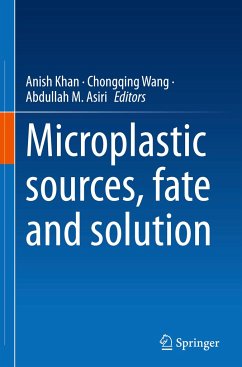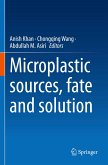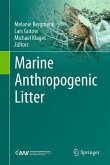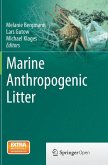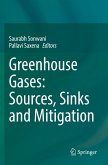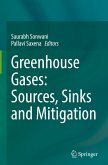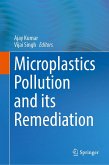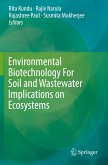Microplastic sources, fate and solution
Herausgegeben:Khan, Anish; Wang, Chongqing; Asiri, Abdullah M.
Microplastic sources, fate and solution
Herausgegeben:Khan, Anish; Wang, Chongqing; Asiri, Abdullah M.
- Gebundenes Buch
- Merkliste
- Auf die Merkliste
- Bewerten Bewerten
- Teilen
- Produkt teilen
- Produkterinnerung
- Produkterinnerung
This book provides an overview of the sources, occurrence, fate and solution of microplastics. Microplastics in sediment and soil environment have been only scarcely surveyed, and no profound discussion on microplastics removal is summarized until this book. Here we focus on sharing clear schematic information and the book sufficiently supports important microplastic topics: such as microbial network, microplastic toxicology and accumulation, agricultural plastics, nylon microplastics, polystyrene microplastics, polyethylene microplastics and many more. The book mainly provides an overview of…mehr
Andere Kunden interessierten sich auch für
![Microplastic sources, fate and solution Microplastic sources, fate and solution]() Microplastic sources, fate and solution164,99 €
Microplastic sources, fate and solution164,99 €![Marine Anthropogenic Litter Marine Anthropogenic Litter]() Marine Anthropogenic Litter38,99 €
Marine Anthropogenic Litter38,99 €![Marine Anthropogenic Litter Marine Anthropogenic Litter]() Marine Anthropogenic Litter38,99 €
Marine Anthropogenic Litter38,99 €![Greenhouse Gases: Sources, Sinks and Mitigation Greenhouse Gases: Sources, Sinks and Mitigation]() Greenhouse Gases: Sources, Sinks and Mitigation127,99 €
Greenhouse Gases: Sources, Sinks and Mitigation127,99 €![Greenhouse Gases: Sources, Sinks and Mitigation Greenhouse Gases: Sources, Sinks and Mitigation]() Greenhouse Gases: Sources, Sinks and Mitigation127,99 €
Greenhouse Gases: Sources, Sinks and Mitigation127,99 €![Microplastics Pollution and its Remediation Microplastics Pollution and its Remediation]() Microplastics Pollution and its Remediation149,99 €
Microplastics Pollution and its Remediation149,99 €![Environmental Biotechnology For Soil and Wastewater Implications on Ecosystems Environmental Biotechnology For Soil and Wastewater Implications on Ecosystems]() Environmental Biotechnology For Soil and Wastewater Implications on Ecosystems112,99 €
Environmental Biotechnology For Soil and Wastewater Implications on Ecosystems112,99 €-
-
-
This book provides an overview of the sources, occurrence, fate and solution of microplastics. Microplastics in sediment and soil environment have been only scarcely surveyed, and no profound discussion on microplastics removal is summarized until this book. Here we focus on sharing clear schematic information and the book sufficiently supports important microplastic topics: such as microbial network, microplastic toxicology and accumulation, agricultural plastics, nylon microplastics, polystyrene microplastics, polyethylene microplastics and many more. The book mainly provides an overview of recent advances in knowledge of sources, occurrence, distribution, chemical behavior and ecological threats while it also presents information related to feasible solutions for microplastic pollution management. This comprehensive resource will be valuable up-to-date knowledge for environmental scientists, ecotoxicologists, ecologists, marine biologists, environmental chemists in the academic field and this book is intended to be beneficial information for environmental managers, water suppliers, wastewater treatment, plastics manufacturer, and policy makers as well.
Produktdetails
- Produktdetails
- Verlag: Springer / Springer Nature Singapore / Springer, Berlin
- Artikelnr. des Verlages: 978-981-99-0694-9
- 2023
- Seitenzahl: 144
- Erscheinungstermin: 29. April 2023
- Englisch
- Abmessung: 241mm x 160mm x 14mm
- Gewicht: 389g
- ISBN-13: 9789819906949
- ISBN-10: 9819906946
- Artikelnr.: 67325296
- Herstellerkennzeichnung
- Springer-Verlag GmbH
- Tiergartenstr. 17
- 69121 Heidelberg
- ProductSafety@springernature.com
- Verlag: Springer / Springer Nature Singapore / Springer, Berlin
- Artikelnr. des Verlages: 978-981-99-0694-9
- 2023
- Seitenzahl: 144
- Erscheinungstermin: 29. April 2023
- Englisch
- Abmessung: 241mm x 160mm x 14mm
- Gewicht: 389g
- ISBN-13: 9789819906949
- ISBN-10: 9819906946
- Artikelnr.: 67325296
- Herstellerkennzeichnung
- Springer-Verlag GmbH
- Tiergartenstr. 17
- 69121 Heidelberg
- ProductSafety@springernature.com
Dr. Chongqing Wang obtained his Ph.D from Central South University in 2017. Dr. Wang became an associate professor in School of Chemical Engineering, Zhengzhou University from 2017. His research field is management of solid wastes. He has co-authored over 54 peer-reviewed papers, and applied 15 Chinese patents. Dr. Wang is the member of International Waste Working Group, the International Association of Advanced Materials and the Advances in Cleaner Production. He is the editorial member of Frontiers in Materials, Current Analytical Chemistry, Nonferrous Metals (Extractive Metallurgy Section) and STEMIO eBooks, as well as the reviewer of over 20 international journals. Dr. Anish Khan is Currently Assistant Professor, Chemistry Department, Centre of Excellence for Advanced Materais Research (CEAMR), Faculty of Science, King Abdulaziz University, Jeddah, Saudi Arabia. Ph.D. from Aligarh Muslim University, India from 2010. Research experience of working in the field of synthetic polymers, organic-inorganic electrically conducting nano-composites. Complete Postdoctoral from School of Chemical Sciences, University Sains Malaysia (USM) electroanalytical chemistry in 2010) on 31st Oct 2011 for one year. Research and teaching experiance. More than 200 research papers published in reffered international journal. More then 20 international conferences/ workshop and 15 books published 20 in progress and 55 Book chapters. Around 20 research project completed. Manageriel Editor of Chemical and Environmental Research (CER) Journal, Member of American Nano Society, Field of specialization is polymer nano composite/cation-exchanger/chemical sensor/microbiosensor/nanotechnology, application of nano materials in electroanalytical chemistry, material chemistry, ion-exchange chromatography and electro-analytical chemistry, dealing with the synthesis, characterization (using different analytical techniques) and derivatization of inorganic ion-exchanger by the incorporation of electrically conducting polymers. Preparation and characterization of hybrid nano composite materials and their applications, Polymeric inorganic cation -exchange materials, Electrically conducting polymeric, materials, Composite material use as Sensors, Green chemistry by remediation of pollution, Heavy metal ion selective membrane electrode, Biosensor on neurotransmitter. Prof. Abdullah Mohammed Ahmed Asiri is Professor in Chemistry Department - Faculty of Science -King Abdulaziz University. Ph.D. (1995) From University of Walls College of Cardiff, U.K. on Tribochromic compounds and their applications. The chairman of the chemistry department , King Abdulaziz University currently and also The Director of the center of Excellence foradvanced Materials Research. Director of Education Affair Unit-Deanship of Community services. Member of Advisory committee for advancing materials, (National Technology Plan, King Abdul Aziz City of Science and Technology, Riyadh, Saudi Arabia). Color chemistry. Synthesis of novel photochromic and thermochromic systems,Synthesis of novel colorants and coloration of textiles and plastics, Molecular Modeling, Applications of organic materials into optics such as OEDS, High performance organic Dyes and pigments. New applications of organic photochromic compounds in new novelty. Organic synthesis of heterocyclic compounds as precursor for dyes. Synthesis of polymers functionalized with organic dyes. Preparation of some coating formulations for different applications. Photodynamic thereby using Organic Dyes and Pigments Virtual Labs and Experimental Simulations. He is member of Editorial board of Journal of Saudi Chemical Society, Journal of King Abdul Aziz University,Pigment and Resin Technology Journal, Organic Chemistry Insights, Libertas Academica, Recent Patents on Materials Science, Bentham Science Publishers Ltd. Beside that he has professional membership of International and National Society and Professional bodies.
Chapter 1. Microplastics in the freshwater and earthbound conditions: Prevalence, destinies, impacts and supportable arrangements.- Chapter 2. Effect of microplastics on microbial network.- Chapter 3.Quick estimation of microplastic in meat.- Chapter 4.Source, migration and toxicology of microplastics in soil.- Chapter 5.Impact of microplastics on nutrient.- Chapter 6.Agricultural plastic mulching as a source of microplastics in the terrestrial condition.- Chapter 7.Worldly and spatial varieties of microplastics in side of the road dust from provincial and urban area, : Implications for diffuse contamination.- Chapter 8.Microplastic particles in the Persian/Arabian Gulf.- Chapter 9.Impacts of microplastic biofilms on supplement cycling in recreated freshwater frameworks.- Chapter 10.Conveyance, bounty and dangers of microplastics in nature.- Chapter 11.Accumulation system of antibiotic medication hydrochloride from fluid arrangements bynylon microplastics.- Chapter 12.Expulsion of microplastics by means of drinking water treatment: Current information and future headings.- Chapter 13.Impacts of polystyrene microplastics on larval advancement, settlement, and transformation.- Chapter 14.Bioaccumulation of microplastics and its in vivo connections.- Chapter 15.Microplastics in oceanic situations: Toxicity to trigger biological results.- Chapter 16.Waterfront sea elements decrease the fare of microplastics to the vast sea.- Chapter 17.Barnacles as potential bioindicator of microplastic contamination in Hong Kong.- Chapter 18.Microplastic accumulation in remote ocean dregs from the Rockall Trough.- Chapter 19.Environmental microplastics: A survey on current status and points of view.- Chapter 20.The joined poisonous quality impact of microplastics and nonylphenol on microalgae Chlorella pyrenoidosa.- Chapter 21.Daylight interceded cadmium discharge from shaded microplastics containing cadmium color in watery stage.- Chapter 22.Environmental microplastic testimony in a urban environment and an assessment of transport.- Chapter 23.Biofilm modifies antibiotic medication and copper adsorption practices onto polyethylene microplastics.
Chapter 1. Microplastics in the freshwater and earthbound conditions: Prevalence, destinies, impacts and supportable arrangements.- Chapter 2. Effect of microplastics on microbial network.- Chapter 3.Quick estimation of microplastic in meat.- Chapter 4.Source, migration and toxicology of microplastics in soil.- Chapter 5.Impact of microplastics on nutrient.- Chapter 6.Agricultural plastic mulching as a source of microplastics in the terrestrial condition.- Chapter 7.Worldly and spatial varieties of microplastics in side of the road dust from provincial and urban area, : Implications for diffuse contamination.- Chapter 8.Microplastic particles in the Persian/Arabian Gulf.- Chapter 9.Impacts of microplastic biofilms on supplement cycling in recreated freshwater frameworks.- Chapter 10.Conveyance, bounty and dangers of microplastics in nature.- Chapter 11.Accumulation system of antibiotic medication hydrochloride from fluid arrangements bynylon microplastics.- Chapter 12.Expulsion of microplastics by means of drinking water treatment: Current information and future headings.- Chapter 13.Impacts of polystyrene microplastics on larval advancement, settlement, and transformation.- Chapter 14.Bioaccumulation of microplastics and its in vivo connections.- Chapter 15.Microplastics in oceanic situations: Toxicity to trigger biological results.- Chapter 16.Waterfront sea elements decrease the fare of microplastics to the vast sea.- Chapter 17.Barnacles as potential bioindicator of microplastic contamination in Hong Kong.- Chapter 18.Microplastic accumulation in remote ocean dregs from the Rockall Trough.- Chapter 19.Environmental microplastics: A survey on current status and points of view.- Chapter 20.The joined poisonous quality impact of microplastics and nonylphenol on microalgae Chlorella pyrenoidosa.- Chapter 21.Daylight interceded cadmium discharge from shaded microplastics containing cadmium color in watery stage.- Chapter 22.Environmental microplastic testimony in a urban environment and an assessment of transport.- Chapter 23.Biofilm modifies antibiotic medication and copper adsorption practices onto polyethylene microplastics.

